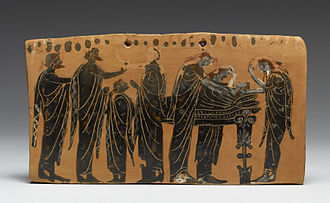Ancient Greek funeral and burial practices
Ancient Greek funeral and burial practices were an integral part of Greek society, reflecting their beliefs and customs surrounding death. These practices varied across different city-states and time periods but shared common elements that emphasized honoring the deceased and ensuring a peaceful transition to the afterlife.
Overview
Ancient Greek funeral and burial practices encompassed a range of rituals and traditions that were deeply rooted in religious beliefs and cultural norms. These practices were considered essential for ensuring the proper passage of the deceased into the afterlife and for maintaining harmony between the living and the dead.
Funeral Rituals
Funeral rituals in ancient Greece typically began with the preparation of the body. The deceased was washed and anointed with oils, a practice known as ekphora. The body was then dressed in burial garments and adorned with jewelry and other personal items. In some cases, a coin was placed in the mouth of the deceased to pay the ferryman Charon for safe passage across the River Styx.
Burial Practices
Burial practices in ancient Greece varied depending on regional customs and social status. The most common form of burial was inhumation, where the body was interred in a grave or tomb. Cremation was also practiced, especially in certain regions or during specific time periods. The graves of the deceased were often marked with gravestones or markers bearing inscriptions and symbols.
Mourning and Commemoration
Mourning rituals in ancient Greece were an important part of the funeral process. Family members and loved ones would engage in mourning practices such as wailing, tearing their garments, and offering libations to the deceased. After the funeral, memorial services and feasts were held to honor and remember the departed.
Afterlife Beliefs
Ancient Greeks believed in an afterlife where the souls of the deceased journeyed to the underworld, ruled by the god Hades. Proper funeral and burial practices were essential for ensuring a smooth transition to the afterlife and for appeasing the spirits of the dead. Failure to perform these rituals could result in the deceased wandering as restless spirits.
Legacy
Ancient Greek funeral and burial practices have left a lasting impact on Western culture and traditions surrounding death and mourning. Many aspects of these practices, such as honoring the deceased with rituals and commemorations, continue to influence modern funeral customs and beliefs.
Transform your life with W8MD's budget GLP-1 injections from $125.
W8MD offers a medical weight loss program to lose weight in Philadelphia. Our physician-supervised medical weight loss provides:
- Most insurances accepted or discounted self-pay rates. We will obtain insurance prior authorizations if needed.
- Generic GLP1 weight loss injections from $125 for the starting dose.
- Also offer prescription weight loss medications including Phentermine, Qsymia, Diethylpropion, Contrave etc.
NYC weight loss doctor appointments
Start your NYC weight loss journey today at our NYC medical weight loss and Philadelphia medical weight loss clinics.
- Call 718-946-5500 to lose weight in NYC or for medical weight loss in Philadelphia 215-676-2334.
- Tags:NYC medical weight loss, Philadelphia lose weight Zepbound NYC, Budget GLP1 weight loss injections, Wegovy Philadelphia, Wegovy NYC, Philadelphia medical weight loss, Brookly weight loss and Wegovy NYC
|
WikiMD's Wellness Encyclopedia |
| Let Food Be Thy Medicine Medicine Thy Food - Hippocrates |
Medical Disclaimer: WikiMD is not a substitute for professional medical advice. The information on WikiMD is provided as an information resource only, may be incorrect, outdated or misleading, and is not to be used or relied on for any diagnostic or treatment purposes. Please consult your health care provider before making any healthcare decisions or for guidance about a specific medical condition. WikiMD expressly disclaims responsibility, and shall have no liability, for any damages, loss, injury, or liability whatsoever suffered as a result of your reliance on the information contained in this site. By visiting this site you agree to the foregoing terms and conditions, which may from time to time be changed or supplemented by WikiMD. If you do not agree to the foregoing terms and conditions, you should not enter or use this site. See full disclaimer.
Credits:Most images are courtesy of Wikimedia commons, and templates, categories Wikipedia, licensed under CC BY SA or similar.
Contributors: Prab R. Tumpati, MD

